过去完成时讲解及练习题(精讲)
过去完成时讲解与习题
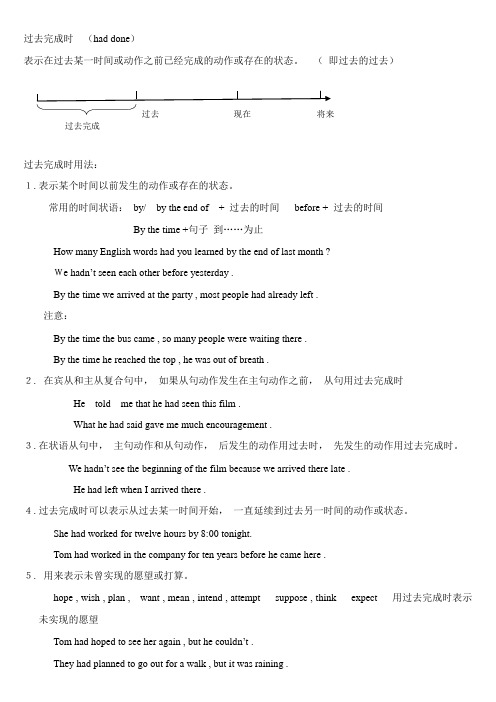
过去完成时(had done)表示在过去某一时间或动作之前已经完成的动作或存在的状态。
(即过去的过去)过去完成时用法:1.表示某个时间以前发生的动作或存在的状态。
常用的时间状语:by/ by the end of + 过去的时间before + 过去的时间By the time +句子到……为止How many English words had you learned by the end of last month ?We hadn’t seen each other before yesterday .By the time we arrived at the party , most people had already left .注意:By the time the bus came , so many people were waiting there .By the time he reached the top , he was out of breath .2.在宾从和主从复合句中,如果从句动作发生在主句动作之前,从句用过去完成时He told me that he had seen this film .What he had said gave me much encouragement .3.在状语从句中,主句动作和从句动作,后发生的动作用过去时,先发生的动作用过去完成时。
We hadn’t see the beginning of the film because we arrived there late .He had left when I arrived there .4.过去完成时可以表示从过去某一时间开始,一直延续到过去另一时间的动作或状态。
She had worked for twelve hours by 8:00 tonight.Tom had worked in the company for ten years before he came here .5.用来表示未曾实现的愿望或打算。
过去完成时讲解及练习题(精讲)
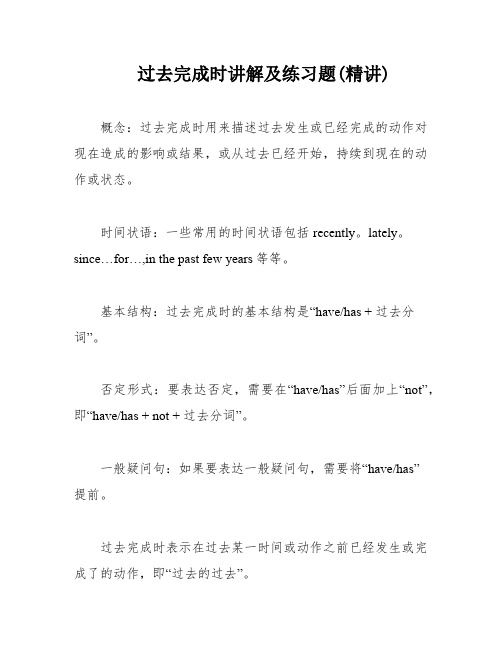
过去完成时讲解及练习题(精讲)概念:过去完成时用来描述过去发生或已经完成的动作对现在造成的影响或结果,或从过去已经开始,持续到现在的动作或状态。
时间状语:一些常用的时间状语包括recently。
lately。
since…for…,in the past few years等等。
基本结构:过去完成时的基本结构是“have/has + 过去分词”。
否定形式:要表达否定,需要在“have/has”后面加上“not”,即“have/has + not + 过去分词”。
一般疑问句:如果要表达一般疑问句,需要将“have/has”提前。
过去完成时表示在过去某一时间或动作之前已经发生或完成了的动作,即“过去的过去”。
构成:过去完成时由“助动词had + 过去分词”构成,其中had通用于各种人称。
例如:They had already had XXX(他们在到达酒店之前已经吃过早餐了。
)XXX 10:00 this morning.(今天早上10点前,她已经写完了作文。
)过去完成时的判断依据有两个:1.由时间状语来判定。
各种时态都有特定的时间状语。
与过去完成时连用的时间状语有:by + 过去的时间点,by the end of + 过去的时间点,before + 过去的时间点等等。
例如:I had finished reading the novel by nine o'clock last night.(昨晚9点前,我已经读完了这本小说。
)XXX English words by the end of last term.(上学期结束时,我们已经学了2000多个英语单词。
)They had XXX last XXX.(上XXX之前,他们已经种了600棵树。
)2.由“过去的过去”来判定。
过去完成时表示“过去的过去”,即过去某一动作之前已经发生或完成的动作,动作有先后关系,动作在前的用过去完成时,在后的用一般过去时。
过去完成时的讲解和练习题(完整解析)

过去完成时的讲解和练习题(完整解析)过去完成时是英语中表示过去某个时间或事件之前已经完成的动作或状态的一种时态。
本文将对过去完成时的用法进行讲解,并提供一些练题进行练。
一、过去完成时的用法1. 表示过去某个时间或事件之前已经完成的动作或状态。
例如:- I had already ___.(当我的朋友给我打电话时,我已经完成了作业。
)- They had already left when we arrived at the party.(当我们到达派对时,他们已经离开了。
)2. 过去完成时与过去时间状语连用。
过去完成时常与表示过去的时间状语连用,例如:before, after, when, by the time, until等。
例如:- She had already bought the tickets before I arrived.(我到达之前,她已经买了票。
)- By the time he woke up, the sun had already risen.(他醒来时,太阳已经升起了。
)二、练题1. 根据括号中的提示,用过去完成时填空。
- When I arrived at the office, he ___ (finish) the task.(完成任务)- They _____ (leave) the party before we got there.(离开派对)- By the time I woke up, she ___ (cook) breakfast.(做早饭)2. 将以下句子改写为过去完成时。
- He had already booked the hotel before they arrived.(在他们到达之前,他已经预订了酒店。
)- We went to the cinema after they had left.(他们离开后,我们去了电影院。
)3. 根据句意,选择合适的动词完成下列句子。
过去完成时的详细讲解和练习题(全面解析)
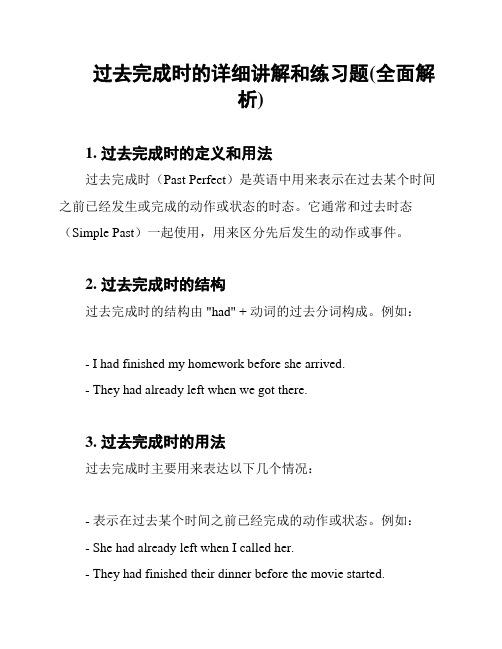
过去完成时的详细讲解和练习题(全面解析)1. 过去完成时的定义和用法过去完成时(Past Perfect)是英语中用来表示在过去某个时间之前已经发生或完成的动作或状态的时态。
它通常和过去时态(Simple Past)一起使用,用来区分先后发生的动作或事件。
2. 过去完成时的结构过去完成时的结构由 "had" + 动词的过去分词构成。
例如:- I had finished my homework before she arrived.- They had already left when we got there.3. 过去完成时的用法过去完成时主要用来表达以下几个情况:- 表示在过去某个时间之前已经完成的动作或状态。
例如:- She had already left when I called her.- They had finished their dinner before the movie started.- 用来构建时间顺序上的递进或对比关系。
例如:- He had visited many countries before he settled down in France.- I had never seen such a beautiful sunset until that day.- 用于条件句中,表示在过去某个时间之前的假设情况。
例如:- If I had known the truth, I would have acted differently.4. 过去完成时的练题请根据句意和语境,使用适当的过去完成时形式填空。
1. By the time I arrived, they __________ their dinner.2. She __________ the book before she went to bed.3. If he __________ more carefully, he wouldn't have made that mistake.4. They __________ their work before the deadline.5. We __________ all the tickets by the time you arrived.参考答案:1. had finished2. had read3. had driven 5. had sold。
过去完成时的详细讲解和练习题(全面解析)
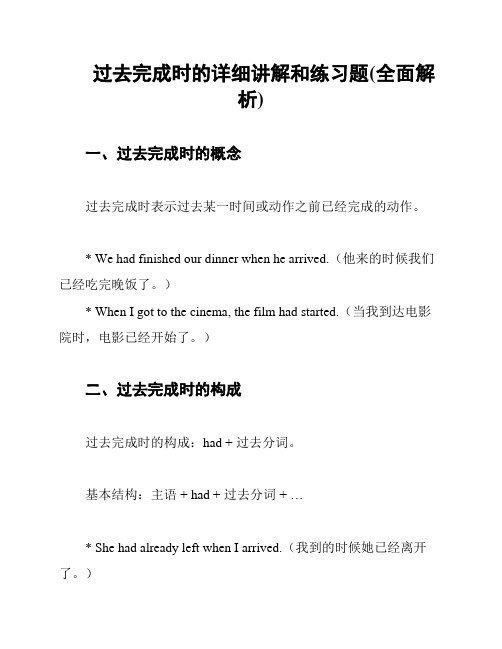
过去完成时的详细讲解和练习题(全面解析)一、过去完成时的概念过去完成时表示过去某一时间或动作之前已经完成的动作。
* We had finished our dinner when he arrived.(他来的时候我们已经吃完晚饭了。
)* When I got to the cinema, the film had started.(当我到达电影院时,电影已经开始了。
)二、过去完成时的构成过去完成时的构成:had + 过去分词。
基本结构:主语 + had + 过去分词+ …* She had already left when I arrived.(我到的时候她已经离开了。
)* I had finished my work before he called.(他打电话之前我已经完成了我的工作。
)三、过去完成时的用法1. 表示过去某个时间点之前已经完成的动作。
* They had gone out before I arrived.(我到之前他们就已经离开了。
)* She had read the book before she went to bed.(她在睡觉前已经读过那本书了。
)2. 表示过去的过去,即在过去某个时间或动作之前已经完成的动作。
常和过去时连用。
* He said that he had visited the museum before.(他说他以前去过博物馆。
)* She had finished her homework when her mother came back.(当她妈妈回来时,她已经完成了作业。
)四、过去完成时的练题1. __________(you, finish) your homework before you went to bed last night?2. By the time we arrived, the party __________(start) .3. I __________(not, see) the movie before last night.4. Before I came to China, I __________(study) Chinese for three years.5. They __________(already, leave) when I got to the station.【答案】1. Had you finished your homework before you went to bed last night?2. By the time we arrived, the party had started.3. I had not seen the movie before last night.4. Before I came to China, I had studied Chinese for three years.5. They had already left when I got to the station.。
初中过去完成时精讲+精练(附答案)
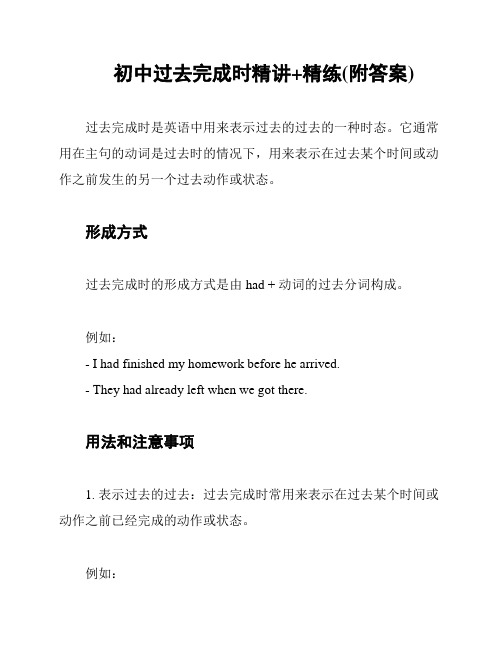
初中过去完成时精讲+精练(附答案)过去完成时是英语中用来表示过去的过去的一种时态。
它通常用在主句的动词是过去时的情况下,用来表示在过去某个时间或动作之前发生的另一个过去动作或状态。
形成方式过去完成时的形成方式是由 had + 动词的过去分词构成。
例如:- I had finished my homework before he arrived.- They had already left when we got there.用法和注意事项1. 表示过去的过去:过去完成时常用来表示在过去某个时间或动作之前已经完成的动作或状态。
例如:- She told me she had already eaten dinner.- He had studied English for five years before he moved to America.2. 引导时间状语从句:过去完成时也可以用来引导时间状语从句,表示在过去某个时间或动作之前已经完成的动作或状态。
例如:- They had finished their work before they went home.3. 与其他过去时态的区别:过去完成时和一般过去时以及过去进行时的区别在于它表示的是在过去的过去发生的动作或状态。
例如:- He said he had already bought the tickets. (过去完成时)- He said he bought the tickets. (一般过去时)精练请用过去完成时来完成下面的句子。
1. I ______ (finish) my homework before my parents came back.2. They ______ (leave) the office when I arrived.3. She ______ (already eat) dinner before we got there.4. We ______ (travel) to Europe many times before we visited Asia.5. He said he ______ (never see) that movie before.答案1. had finished2. had left3. had already eaten4. had traveled5. had never seen。
过去完成时态讲解及练习

完毕时态1)过去完毕时态的构成:必定式:had +动词的过去分词否认式:hadn't + 动词的过去分词疑问式:Had … + 动词的过去分词简略回答: Yes, 主+ have/has had.No, 主+ had 现在完毕时的使用方法2)过去完毕时合用场合1.过去完毕时表达在过去某一时间或动作以前已经完毕了的动作。
这个过去的时间惯用by,before 等介词短语或一种时间状语从句表达,也能够暗含在上下文中。
I had finished my homework before supper.我在晚饭前就把作业做完了。
The play had already started when we got to the theatre. 我们到剧场时戏已经开始了。
By the end of June they had treated over 10,000 patients. 到六月底他们已经治疗了一万多病人。
2.过去完毕时还可表达过去某一时刻之前发生的动作或状态持续到过去某个时间或还要持续下去,常与for,since 等词连用。
如:He had served in the army for ten years before he retired last year. 他在部队干了十年,去年退役了。
He told me that he had known her since he was a child. 他告诉我他从小就认识她。
He had learned English for eight years before he went to England for further study. 他在去英国深造前,已学了八年英语。
3.在一段情景连贯的文字中,先发生的事放在背面叙述时,要用过去完毕时。
如:Tom flew home, but his father had already died. 汤姆乘飞机回家,他的父亲却已经逝世了。
初中过去完成时态讲解带练习
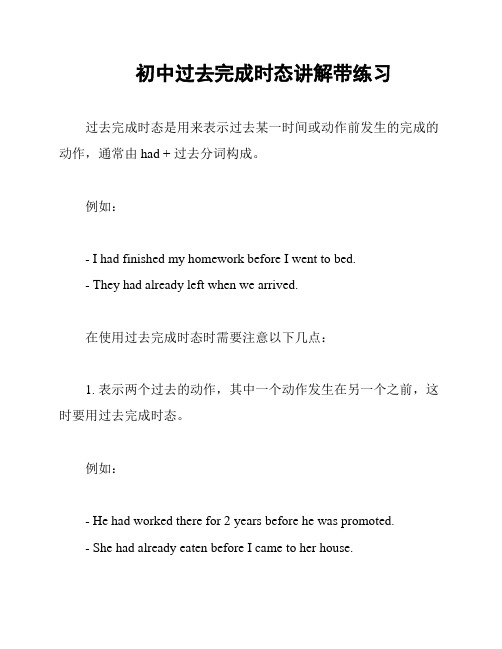
初中过去完成时态讲解带练习过去完成时态是用来表示过去某一时间或动作前发生的完成的动作,通常由had + 过去分词构成。
例如:- I had finished my homework before I went to bed.- They had already left when we arrived.在使用过去完成时态时需要注意以下几点:1. 表示两个过去的动作,其中一个动作发生在另一个之前,这时要用过去完成时态。
例如:- He had worked there for 2 years before he was promoted.- She had already eaten before I came to her house.2. 句子中需要明确表示一个动作发生在另一个动作之前,可以使用过去完成时态。
例如:- When I got home, my mother had already cooked dinner.- By the time we arrived at the cinema, the movie had already started.3. 注意过去完成时态的时间范围,它仅限于过去发生的动作,而不包括现在的动作。
例如:- I have been to Japan before. (不可用过去完成时态)以下是一些练,请用过去完成时态填空:1. By the time I ______ (arrive) at the party, everyone had left.2. She _______ (not finish) her work, so she had to stay late.3. When he __________ (arrive) at the station, the train had already left.4. They _________ (cook) dinner before their guests arrived.5. We _______ (already watch) that movie before.答案:1. arrived2. had not finished3. arrived4. had cooked5. had already watched。
- 1、下载文档前请自行甄别文档内容的完整性,平台不提供额外的编辑、内容补充、找答案等附加服务。
- 2、"仅部分预览"的文档,不可在线预览部分如存在完整性等问题,可反馈申请退款(可完整预览的文档不适用该条件!)。
- 3、如文档侵犯您的权益,请联系客服反馈,我们会尽快为您处理(人工客服工作时间:9:00-18:30)。
过去完成时1.概念:过去发生或已经完成的动作对现在造成的影响或结果,或从过去已经开始,持续到现在的动作或状态。
2.时间状语:recently, lately, since…for…,in the past few years, etc.3.基本结构:have/has + done4.否定形式:have/has + not +done.5.一般疑问句:have或has提前概念:过去完成时表示在过去某一时间或动作之前已经发生或完成了的动作,即"过去的过去(past-in-the-past )"。
----|-------------------------- |-------------------------------|---------------------------->那时以前那时现在构成:过去完成时由"助动词had + 过去分词"构成,其中had 通用于各种人称。
They had already had breakfast before they arrived at the hotel.She had finished writing the composition by 10 :00 this morning.二、过去完成时的判断依据1. 由时间状语来判定一般说来,各种时态都有特定的时间状语。
与过去完成时连用的时间状语有:(1 )by + 过去的时间点。
如:I had finished reading the novel by nine o'clock last night.(2 )by the end of + 过去的时间点。
如:We had learned over two thousand English words by the end of last term.(3 )before + 过去的时间点。
如:They had planted six hundred trees before last Wednesday.2. 由"过去的过去"来判定。
过去完成时表示"过去的过去",是指过去某一动作之前已经发生或完成的动作,即动作有先后关系,动作在前的用过去完成时,在后的用一般过去时。
这种用法常出现在:(1 )宾语从句中当宾语从句的主句为一般过去时,且从句的动作先于主句的动作时,从句要用过去完成时。
在told, said, knew, heard, thought等动词后的宾语从句。
如:She said that she had seen the film before.(2 )状语从句中在时间、条件、原因、方式等状语从句中,主、从句的动作发生有先后关系,动作在前的,要用过去完成时,动作在后的要用一般过去时。
如:When I got to the station, the train had already left.After he had finished his homework, he went to bed.注意:before, after 引导的时间状语从句中,由于before 和after 本身已表达了动作的先后关系,若主、从句表示的动作紧密相连,则主、从句都用一般过去时。
如:Where did you study before you came here?After he closed the door, he left the classroom.(3 )表示意向的动词,如hope, wish, expect, think, intend, mean, suppose等,用过去完成时表示"原本…,未能…"We had hoped that you would come, but you didn't.3. 根据上、下文来判定。
I met Wang Tao in the street yesterday. We hadn't seen each other since he went to Beijing.三、过去完成时的主要用法1. 过去完成时表示一个动作或状态在过去某一时间或动作之前已经完成或结束,即发生在"过去的过去"。
如:When I woke up, it had stopped raining.我醒来时,雨已经停了。
(主句的动作发生在"过去的过去")2. 过去完成时是一个相对的时态,表示的是"过去的过去",只有和过去某一时间或某一动作相比较时才使用它。
如:He told me that he had written a new book. (had written 发生在told 之前)3. 过去完成时需要与一个表示过去的时间状语连用,它不能离开过去时间而独立存在。
此时多与already ,yet ,still ,just ,before ,never 等时间副词及by ,before ,until 等引导的短语或从句连用。
如:Before she came to China, Grace had taught English in a middle school for about five years.Peter had collected more than 300 Chinese stamps by the time he was ten.4. 过去完成时表示某一动作或状态在过去某时之前已经开始,一直延续到这一过去时间,而且动作尚未结束,仍然有继续下去的可能。
如:By the end of last year, he had worked in the factory for twenty years. (had worked 已有了20 年,还有继续进行下去的可能)四、过去完成时与现在完成时的区别现在完成时表示的动作发生在过去,但侧重对现在产生的结果或造成的影响,与现在有关,其结构为"助动词have (has) + 过去分词";过去完成时则是一个相对的时态,它所表示的动作不仅发生在过去,更强调"过去的过去",只有和过去某时或某动作相比较时,才用到它。
试比较:I have learned 1000 English words so far.到目前为止我已经学会了1000 个英语单词。
I had learned 1000 English words till then.到那时为止我已经学会了1000 个英语单词。
- I'm sorry to keep you waiting. 对不起,让你久等了。
- Oh, not at all. I have been here only a few minutes.没什么,我只等了几分钟。
("等"的动作从过去某一时间点持续到现在)- John returned home yesterday. 约翰昨天回到家的。
- Where had he been?他去哪儿了?(答语中使用过去完成时是指约翰在returned home 之前去了哪些地方,即"过去的过去")五、过去完成时与一般过去时的区别虽然这两种时态都表示过去发生的动作或存在的状态,但在使用时应注意以下几点:1. 时间状语不同:过去完成时在时间上强调"过去的过去";而一般过去时只强调过去某一特定的时间。
试比较:They had arrived at the station by ten yesterday.They arrived at the station at ten yesterday.2. 在没有明确的过去时间状语作标志时,谓语动词动作发生的时间先后须依据上下文来判断:先发生的用过去完成时,后发生的则用一般过去时。
如:She was very happy. Her whole family were pleased with her, too. She had just won thefirst in the composition competition.3. 当两个或两个以上接连发生的动作用and 或but 连接时,按时间顺序,只需用一般过去时来代替过去完成时;另外,在before ,after ,as soon as 引导的从句中,由于这些连词本身已经表示出时间的先后,因此也可以用过去时来代替过去完成时。
如:He entered the room, turned on the light and read an evening paperI (had) called her before I left the office.过去完成时可表示过去未曾实现的想法和打算,通常连用的动词是want, think, hope, plan, mean, expect, intend, suppose 等:I had meant to come, but something happened. 我本想来,但有事就没有来。
I had intended to speak, but time did not permit. 我本想发言,但时间不允许。
We had hoped that you would come to see us, but you didn’t. 我们本想你来看我们的,但你没有来。
过去完成时练习题1. 单项选择1.He asked me _____ during the summer holidays.A. where I had beenB. where I had goneC. where had I beenD. where had I gone2. What ____ Jane ____ by the time he was sever?A. did, doB. has, done C did, did. D. had, done3. I ______ 900 English words by the time I was ten。
A. learnedB. was learningC. had learnedD. learnt4. She ______lived here for ______ years.A. had, a fewB. has, severalC. had, a lot ofD. has, a great deal of5. By the time my parents reached home yesterday, I _____ the dinner already.A had cooked B. cooked C. have cooked D. was cooked6. She said she __________ the principle alreadyA .has seen B. saw C. will see D. had seen7. She said her family _______ themselves ______ the army during the war.A. has hidden, fromB. had hidden, fromC. has hidden, withD. had hidden, with8. By the time he was ten years old, he _________.A. has completed universityB. has completed the universityB. had completed an university D. had completed university9. She had written a number of books ______ the end of last year.A. forB. inC. byD. at10. He _____ to play ____ before he was 11 years old.A had learned, piano B. had learned, the pianoC. has learned, the pianoD. learns ,piano.11. What _______ Annie ____ by the time he was ten?A. did, doB. did, didC. has, doneD. had done12 .He ___ in the factory for three years before he joined the Army.A. has workedB. worksC. had workedD. will work13. By the end of last week, they ____ the bridge.A. has completedB. completedC. will completeD. had completed14. Ben hates playing _____ violin, but he likes playing ____ football.A. a…theB. the… theC. / …theD. the…/15. By the time he was 4, he ______ a lot of German words.A. had learnedB. has learnedC. learnedD. learns16 .Jim turned off the lights and then _____ the classroom.A. was leftB. had leftC. has leftD. left17.They _________ in Guangzhou since 2000.A. livedB. had livedC. have livedD. were living18. The train from Beijing_______ ten minutes ago.A. has arrivedB. was arrivingC. arrivedD. had arrived19. The students _________ their classroom when the visitors arrived.A . have cleaned B. had cleaned C. was cleaned D. have been cleaned20. Fergie_______ the project in one hour.A. have finishedB. will finishC. finishesD. has finished21. The man ________ his coat and went out.A. put onB. had put onC. will put onD. was putting on22 My mother______ in that factory at the age of 18.A. had workedB. has workedC. workedD. works23. Dad ________ while he _______ TV.A .fell asleep…watch B. was falling asleep…watchedC. fell asleep……was watchingD. had fallen asleep…watched2.用动词的适当形式填空1. We _____________ (paint) the house before we ______________ (move) in.2. That rich old man _____________ (make) a will before he _____________ (die).3. They _____________ (study) the map of the country before they ________ (leave).4. The robbers _____________ (run away ) before the policemen _______ (arrive).5. I __________ (turn off) all the lights before I ____________ (go) to bed.6. Paul __________ (go) out with Jane after he __________ (make) a phone call.7. Tom __________ (say) he ___________ (read) the book twice.8. Our plan ____________ (fail ) because we _____________ (make) a bad mistake.9. When the chairman ______________ (finish) speaking, he _____________ (leave)the hall.10.The Reads __ ______ (have) lunch when I ________________(get) to their house.11.When I ______________(arrive) at the station, he ____________________(leave).12..We _______________(learn) about 4000 English words by the end of last term.13. I waited until he _______________(finish) his homework.14. We were surprised at what she ________already ______(do)15.She ____________(not go) to Qingdao because she ________________ (go) there before.16. He ______________(not tell) you the news yet.17. He said he _____________already_________(give) the book to the teacher.18. I ______________(be) to Shanghai before.19. She told me she _________________(be) to Sanya three times.20.She _____________(play) the guitar while her sister_______________(sing).。
